Demolition Contractors Kidderminster
Find top Demolition Contractors Near Me in Kidderminster
Receive 3 FREE Demolition Contractors quotes for your project today! Compare profiles, reviews, accreditations, portfolio, etc... and choose the best deal.
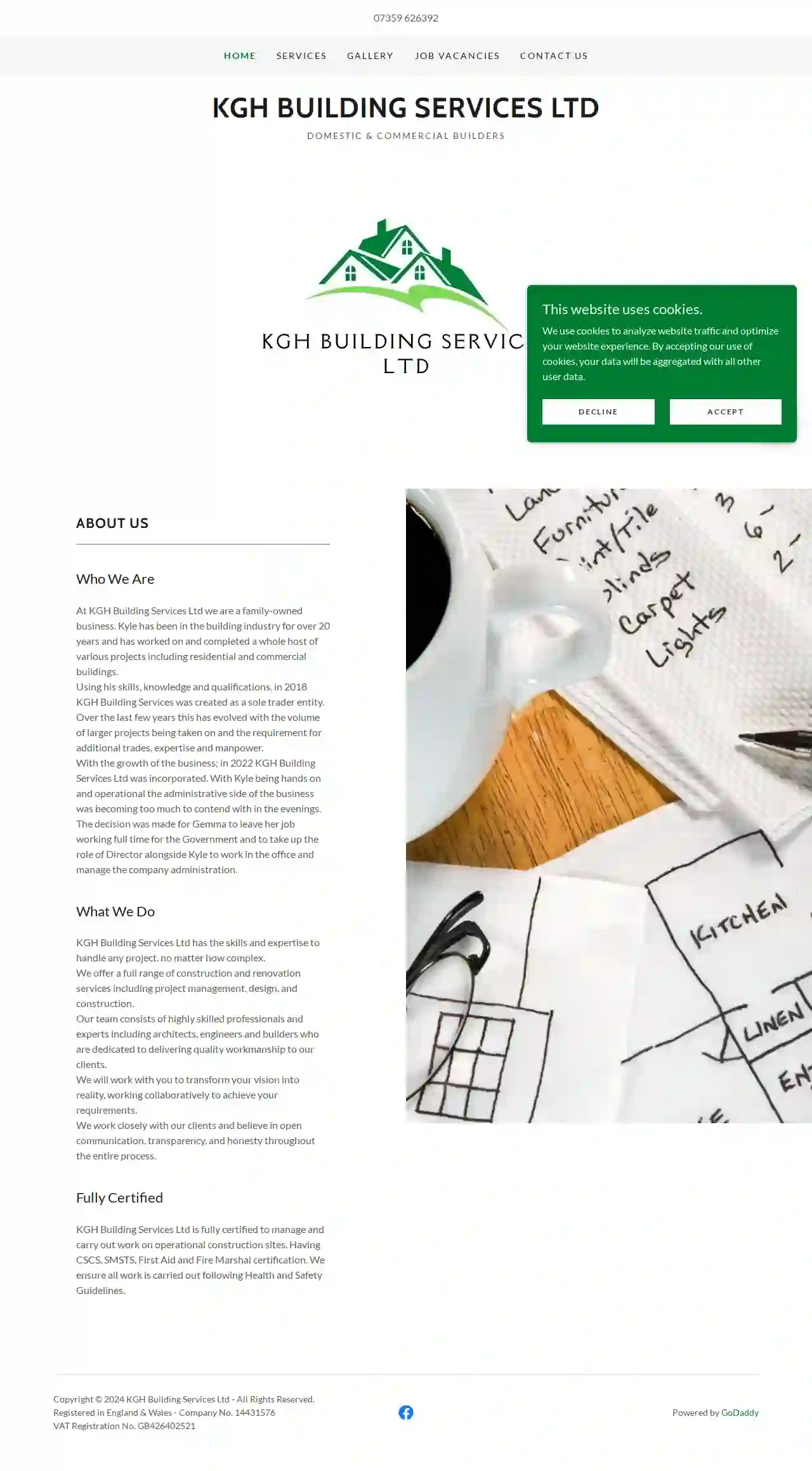
KGH Building Services Ltd
1Kidderminster, Worcestershire, GBAbout Us At KGH Building Services Ltd we are a family-owned business. Kyle has been in the building industry for over 20 years and has worked on and completed a whole host of various projects including residential and commercial buildings. Using his skills, knowledge and qualifications, in 2018 KGH Building Services was created as a sole trader entity. Over the last few years this has evolved with the volume of larger projects being taken on and the requirement for additional trades, expertise and manpower. With the growth of the business; in 2022 KGH Building Services Ltd was incorporated. With Kyle being hands on and operational the administrative side of the business was becoming too much to contend with in the evenings. The decision was made for Gemma to leave her job working full time for the Government and to take up the role of Director alongside Kyle to work in the office and manage the company administration. What We Do KGH Building Services Ltd has the skills and expertise to handle any project, no matter how complex. We offer a full range of construction and renovation services including project management, design, and construction. Our team consists of highly skilled professionals and experts including architects, engineers and builders who are dedicated to delivering quality workmanship to our clients. We will work with you to transform your vision into reality, working collaboratively to achieve your requirements. We work closely with our clients and believe in open communication, transparency, and honesty throughout the entire process. Fully Certified KGH Building Services Ltd is fully certified to manage and carry out work on operational construction sites. Having CSCS, SMSTS, First Aid and Fire Marshal certification. We ensure all work is carried out following Health and Safety Guidelines.
- Services
- Why Us?
- Our Team
- Gallery
Get Quote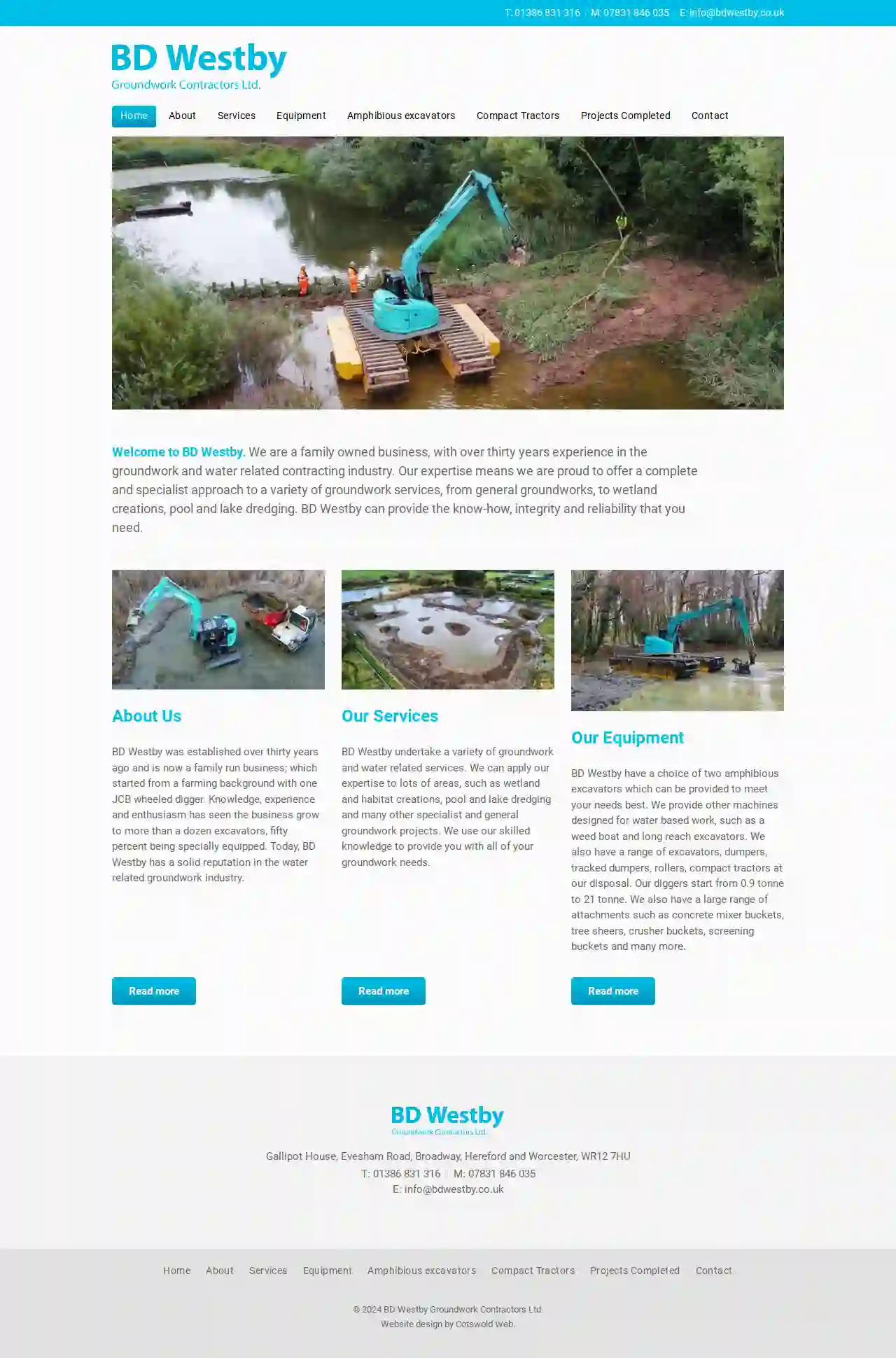
BD Westby Groundwork Contractors Ltd
1Gallipot House, Evesham Road, Broadway, Hereford and Worcester, WR12 7HU, GBAbout BD Westby BD Westby is a family-owned business with over thirty years of experience in the groundwork and water-related contracting industry. We pride ourselves on offering a complete and specialist approach to a variety of groundwork services, from general groundworks to wetland creations, pool and lake dredging. BD Westby provides the know-how, integrity, and reliability you need. BD Westby was established over thirty years ago and is now a family-run business; which started from a farming background with one JCB wheeled digger. Knowledge, experience, and enthusiasm have seen the business grow to more than a dozen excavators, fifty percent being specially equipped. Today, BD Westby has a solid reputation in the water-related groundwork industry. With a wide range of rollers, dumpers, and attachments, our diggers start from 0.9 ton to 21 ton, with some being equipped with amphibious undercarriages, low ground pressure tracks, and tiltrotators, this provides us with the tools you need to get the job done. We only hire machinery with operators, meaning you get an assured and expert service wherever you are. BD Westby covers a large area, having completed projects all around the UK with operated plant or contracting services. We also specialize in the unusual – offering a truly groundbreaking groundwork service, no matter what.
- Services
- Why Us?
- Gallery
Get Quote
Bai Construction Ltd
1191 Northwick Road, Worcester, WR3 7EJ, GBAbout Us Bai Construction Ltd is owned and run by Phil Baily who has 20 years’ experience in the construction industry across multiple disciplines. We pride ourselves on a superior level of customer service based on respect, reliability, quality and transparency. The detail and thought in our quotations is extremely rare in the construction industry giving customers confidence that their project will be delivered on time, on budget and to the highest quality without any nasty surprises or hidden extras. Decisions required and the processes involved are always communicated in a clear way in good time to allow the customer to make the right choice for them without holding up the build programme. Please get in touch today with any enquiry you may have and we will be happy to assist.
- Services
- Why Us?
- Gallery
Get Quote
Unblocking Worcestershire Drains
1Worcester, GBDrainage Expert: Your Reliable Solution for All Drain Problems Drainage Expert is a family-run drainage company based in Malvern, in the heart of the Midlands. With over 20 years of experience, we're dedicated to providing fast, efficient, and cost-effective solutions for all your drainage needs. Whether you're dealing with a blocked drain, a leaky pipe, or tree root intrusion, we have the expertise and equipment to get the job done right. We understand that dealing with drainage issues can be stressful. That's why we offer 24/7 service, ensuring that help is always just a phone call away. Our skilled and experienced team will arrive promptly, assess the problem, and provide a clear solution with a fixed cost. We're committed to providing the best possible service and ensuring your complete satisfaction. We offer a wide range of services, including: High pressure cleaning Manual rodding Unblocking drains, sinks, baths & toilets Gutters And Gullies Tree root removal in drains CCTV Camera surveys Domestic or commercial Drain repairs and drain lining Manhole repairs soakaways Drainage report for home buyers Don't hesitate to contact us for a free quote or to discuss your drainage needs. We're here to help you get your drains flowing smoothly again.
- Services
- Why Us?
- Gallery
Get Quote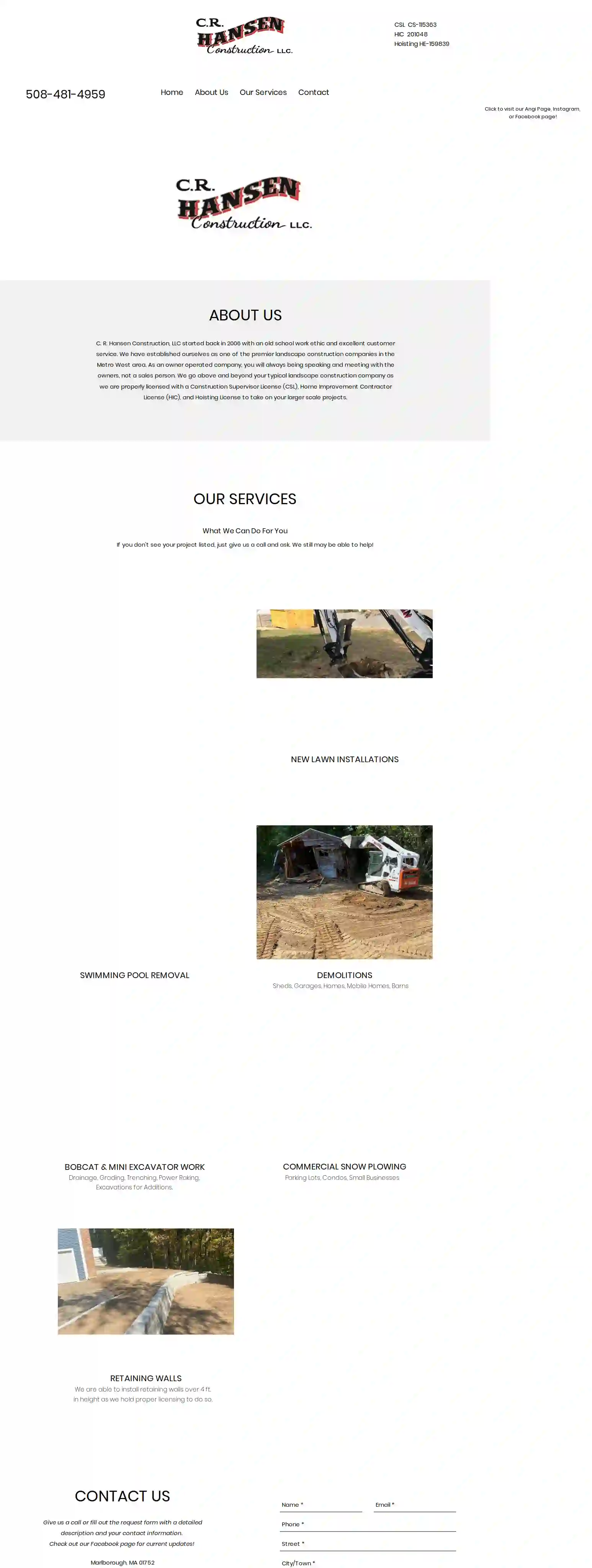
C. R. Hansen Construction, LLC.
4.517 reviewsMarlborough, 01752, GBAbout Us C. R. Hansen Construction, LLC was founded in 2006 with a commitment to old-school work ethic and exceptional customer service. We've established ourselves as a leading landscape construction company in the Metro West area. As an owner-operated business, you'll always be working directly with the owners, not just a salesperson. We go beyond the typical landscape construction company by holding a Construction Supervisor License (CSL), Home Improvement Contractor License (HIC), and Hoisting License, allowing us to handle larger-scale projects.
- Services
- Why Us?
- Gallery
Get Quote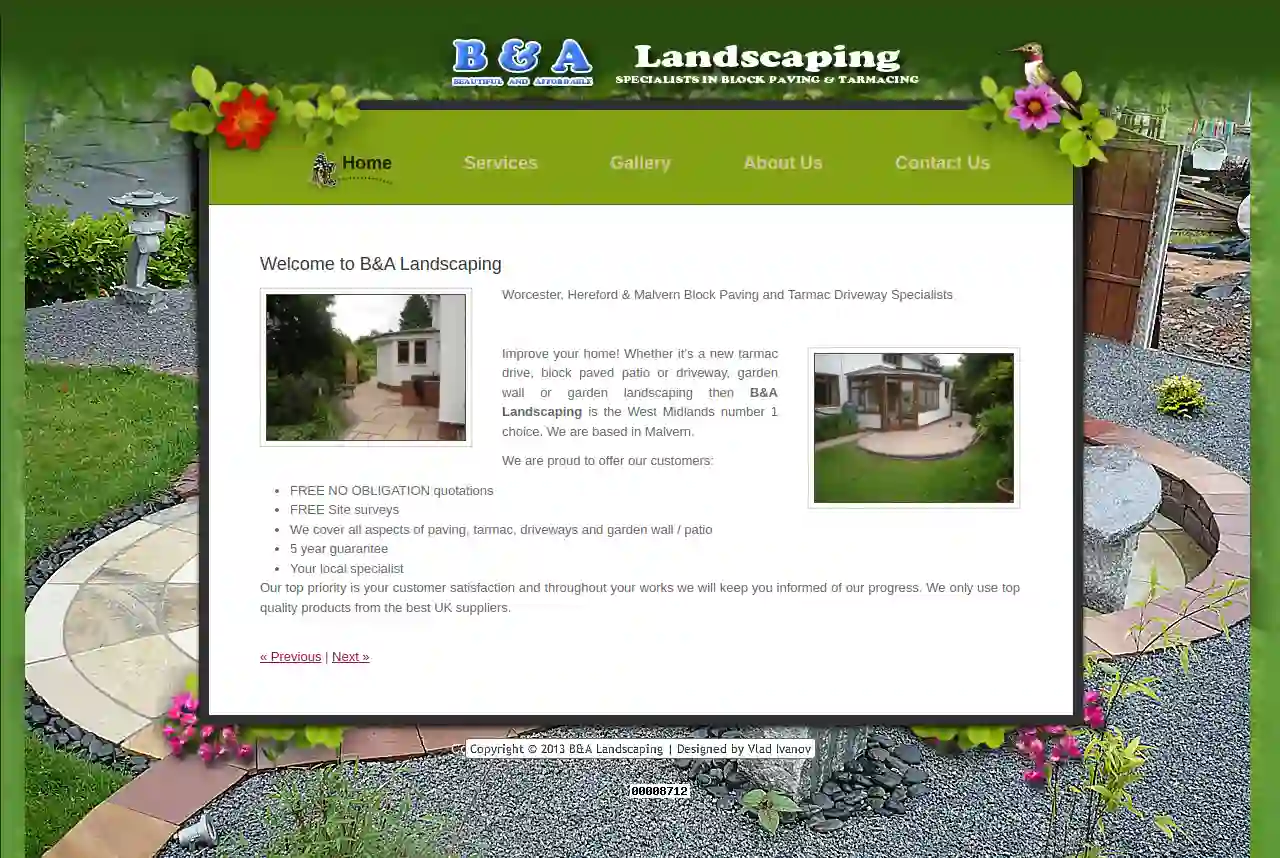
B&A LANDSCAPING AND DRIVEWAYS SERVICES
45 reviewsWooden Farm, Bromyard Road, Cradley, Malvern, Worcs, WR13 5JW, GBAbout B&A Landscaping B&A Landscaping, your trusted block paving and tarmac specialists, are based in Malvern and proudly serve Worcestershire, Herefordshire, and Gloucestershire. We've built a reputation for delivering exceptional quality, craftsmanship, and skill in every project. Our team of dedicated professionals is committed to providing courteous and friendly service, ensuring your complete satisfaction. Transforming Your Outdoor Spaces Let our skilled team transform your outdated drive or patio into a stunning masterpiece that will be the envy of your neighborhood. Not only will it enhance your property's curb appeal, but it will also add significant value. We utilize the highest quality materials sourced from leading UK suppliers, offering a wide range of options to suit your preferences. Unmatched Expertise and Services From tarmac in classic red or black to a vast selection of block paving styles, types, and colors, we have the perfect solution for your needs. We provide expert advice on best practices for turfing, re-turfing, brick and garden walls, patios, patio slabs, drainage, manhole coverings, car parks, turning areas, landscaping, block paving, block driveways, tarmac driveways, tarmac drives, gravel drives, hardstanding, garden paths and pathways, and commercial parking areas.
- Services
- Why Us?
- Gallery
Get Quote
EMS Geotech
1The Old Surgery, 22a King Street, Hereford, Herefordshire, HR4 9DA, GBGeo-Environmental and Geotechnical Services We work throughout the UK, with focus on Herefordshire, Worcestershire, Shropshire, Gloucestershire and South Wales Market Leaders in Geo-Environmental and Geotechnical Services As ground investigation experts, EMS Geotech provide a range of Geotechnical, Geo-Environmental and contaminated land services in accordance with BS 5930: 2015, BS 10175: 2013 and Eurocode EC7: Parts 1 and 2 (ref BS EN 1997-1:2004 and BS EN 1997-2:2007) EMS Geotech work primarily throughout Herefordshire, Worcestershire, Shropshire, Cardiff & South Wales but provide UK wide coverage with a wide range of public and private sector clients. Our specialist, local geotechnical consultants have experience working on projects of various sizes throughout Herefordshire, Worcestershire, Shropshire and Powys, relating to residential, commercial & light industrial, utilities, infrastructure and landfill. This background and knowledge allows us to offer a range of environmental surveys and assessments. EMS GEOTECH SERVICES Our geo-environmental engineers have experience working on projects of various sizes including utilities, infrastructure and landfill, residential, industrial & commercial
- Services
- Why Us?
- Our Team
- Gallery
Get Quote
Efficiency Pro Paving, Excavation, Water, Sewer, and Landscaping
1Worcester, GBEfficiency Paving Efficiency Paving is a dependable family-owned paving company dedicated to providing high-quality services for all your paving needs. We specialize in a wide range of services, including excavation, retaining walls, stone walls, patios, landscaping, and hardscaping. Our team is committed to delivering exceptional results, exceeding your expectations with every project. We understand that your property is an investment, and we treat it with the utmost care and respect. Our experienced professionals use the latest techniques and equipment to ensure your project is completed on time and within budget. We take pride in our craftsmanship and attention to detail, ensuring a lasting and beautiful finish. Contact us today for a free consultation and let us help you transform your vision into reality.
- Services
- Why Us?
- Gallery
Get Quote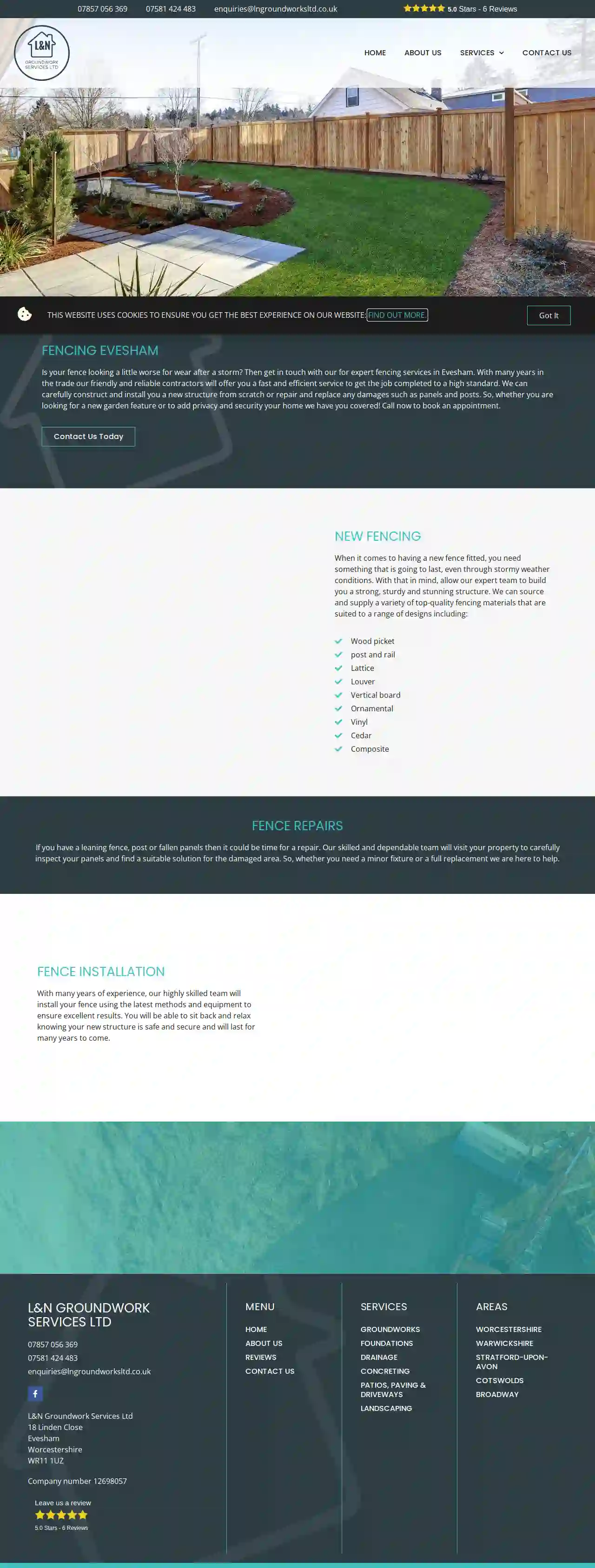
L&N Groundwork Services Ltd
118 Linden Close, Evesham, WR11 1UZ, GBGroundwork Contractors Evesham If you are looking for a well-established and professional groundwork contractors in Evesham, then make us your first choice. We offer an extensive range of services covering all areas of groundworks and hard landscaping from excavation, footings and foundations to wall building block paving and lawn laying. Our highly skilled groundworkers use the latest equipment and source top quality materials to ensure the job is delivered to a high standard every time. So, whether you need a minor repair or a major installation get in touch with our dependable team today. Why Choose Us? Over 45 years of combined industry experience Local and reliable family run business Fully insured and full public liability Free no obligation quotes SMSTS accredited Cover both commercial and domestic work High standard finishes Supplies all materials Fully CITB qualified CPCS Scheme machinery Fully qualified first aid, site managers Groundwork & Landscaping Services We will make it our mission to transform your property no matter what the task. We cover a wide range of services including: Excavation Earthworks Footings Foundations Drainage work Commercial and industrial flooring Concreting Patios and driveways Steps and wall building Fencing Lawn Laying Surfacing Site clearance Repair work and installation Top Quality Supplies We source and supply all the materials and equipment that is needed for your groundwork or landscaping project to make the process as easy and stress free for you as possible. You will be able to sit back and relax while we take care of the hard work.
- Services
- Why Us?
- Testimonials
- Gallery
Get Quote
Finney's Property Contractors Limited
517 reviewsUnit 1, The Hillbee Farm, Welland Road, Upton upon Severn, Worcestershire, WR8 0SN, GBWelcome to the FPC Group Quality-driven, professional property contractors covering Worcestershire, Herefordshire and Gloucestershire Your Trusted, Quality-Assured Property Contractors in the Three Counties The Finney’s Property Contractors (FPC) Group is a leading property contractor in Worcestershire. Whether it’s roofing, renovations, resurfacing or scaffolding, you’re in the right place to receive an honest, no-nonsense, and affordable service that never shirks on quality. As dynamic property contractors with multi-disciplinary skills and expertise, your property requirements are in safe, skilled and hassle-free hands. For more details about how any of our services can improve and add value to your property, get in touch today. The Areas Our Property Contractors Cover As leading property contractors across the Three Counties and surrounding areas, all our services are available within a 30-mile radius of our HQ in Upton-Upon-Severn near Malvern, Worcestershire. These catchment areas include: Ledbury | Hereford | Worcester | Malvern | Tewkesbury | Cheltenham | Evesham | Pershore | Droitwich Our Story The FPC Group story didn’t happen overnight. Through hard work, maintaining high standards and 16 years of dedication, we’ve taken our humble beginning in Upton-Upon-Severn to become a dynamic property contractor serving Worcestershire, Herefordshire, Gloucestershire and beyond. First founded by brothers Shaun and Shane Finney, FPC has grown into an industry leader across the Three Counties and surrounding areas. Yet, despite our growth, we keep our people and customers at the heart of what we do. That’s why each team member is employed directly by the FPC Group and trained in-house to ensure our quality, standards, and consistency remain the same no matter the job. No subtractors. No-nonsense. With the FPC Group, you get premium results with a personal touch. To discover more about origins and credentials as property contractors, visit our About page. Why Choose FPC as Your Property Contractor Rather than the hassle of hiring multiple contractors for your property issues, you can choose just one. Because with the FPC Group, all your requirements are in one place.
- Services
- Why Us?
- Accreditations
- Testimonials
- Gallery
Get Quote
Over 11,537+ Excavation Contractors on our directory
Our excavation contractors operate in Kidderminster and surrounding areas!
ExcavationHQ has curated and vetted Top Excavation Companies in and around Kidderminster. Find a top & reliable business today.
Frequently Asked Questions About Demolition Contractors
- Dust Suppression: Use water spraying, misting systems, or other dust suppression techniques to control airborne particles.
- Noise Barriers: Erect temporary noise barriers around the demolition site to reduce noise transmission to nearby properties.
- Work Schedule: Schedule noisy demolition activities during permitted hours to minimize disturbance to neighbors.
- Communication: Keep neighbors informed about the demolition schedule and any potential disruptions.
- Implosion: Using explosives to collapse a structure inwards rapidly. Suitable for large buildings in open areas.
- Wrecking Ball: Swinging a large steel ball to impact and break down the structure. Effective for bringing down walls and other solid elements.
- High-Reach Demolition: Utilizing specialized excavators with extended arms and demolition attachments for dismantling tall structures piece by piece.
- Selective Demolition: Removing specific parts of a building while preserving other sections. Often used in renovation projects.
- Deconstruction: Carefully dismantling a building to salvage reusable materials, reducing waste and environmental impact.
- Feasibility Studies: Assessing the viability and challenges of a demolition project.
- Demolition Planning: Developing demolition plans, including method selection, sequencing, and safety procedures.
- Permitting Assistance: Navigating the demolition permitting process and ensuring compliance with regulations.
- Hazardous Material Surveys: Identifying and managing hazardous materials, such as asbestos and lead paint.
- Cost Estimating: Providing accurate cost estimates for demolition services.
- Project Management: Overseeing the demolition process and ensuring it proceeds as planned.
- 'Can I see proof of your licensing and insurance?' Verify their credentials and coverage.
- 'What experience do you have with projects like mine?' Ensure they have relevant expertise.
- 'Can you provide references from past clients?' Check their reputation and customer satisfaction.
- 'What are your safety protocols?' Prioritize contractors who emphasize safety.
- 'How will you handle hazardous materials?' Ensure they have proper procedures for asbestos or lead abatement.
- 'What is your timeline for completing the project?' Understand the project duration.
- 'How will you manage noise, dust, and debris?' Discuss mitigation measures for minimizing disruption.
- 'What are your payment terms?' Clarify payment schedules and any required deposits.
How can I minimize the dust and noise from demolition?
What are the different types of demolition?
What is the role of a demolition consultant?
What questions should I ask a demolition contractor before hiring them?
How can I minimize the dust and noise from demolition?
- Dust Suppression: Use water spraying, misting systems, or other dust suppression techniques to control airborne particles.
- Noise Barriers: Erect temporary noise barriers around the demolition site to reduce noise transmission to nearby properties.
- Work Schedule: Schedule noisy demolition activities during permitted hours to minimize disturbance to neighbors.
- Communication: Keep neighbors informed about the demolition schedule and any potential disruptions.
What are the different types of demolition?
- Implosion: Using explosives to collapse a structure inwards rapidly. Suitable for large buildings in open areas.
- Wrecking Ball: Swinging a large steel ball to impact and break down the structure. Effective for bringing down walls and other solid elements.
- High-Reach Demolition: Utilizing specialized excavators with extended arms and demolition attachments for dismantling tall structures piece by piece.
- Selective Demolition: Removing specific parts of a building while preserving other sections. Often used in renovation projects.
- Deconstruction: Carefully dismantling a building to salvage reusable materials, reducing waste and environmental impact.
What is the role of a demolition consultant?
- Feasibility Studies: Assessing the viability and challenges of a demolition project.
- Demolition Planning: Developing demolition plans, including method selection, sequencing, and safety procedures.
- Permitting Assistance: Navigating the demolition permitting process and ensuring compliance with regulations.
- Hazardous Material Surveys: Identifying and managing hazardous materials, such as asbestos and lead paint.
- Cost Estimating: Providing accurate cost estimates for demolition services.
- Project Management: Overseeing the demolition process and ensuring it proceeds as planned.
What questions should I ask a demolition contractor before hiring them?
- 'Can I see proof of your licensing and insurance?' Verify their credentials and coverage.
- 'What experience do you have with projects like mine?' Ensure they have relevant expertise.
- 'Can you provide references from past clients?' Check their reputation and customer satisfaction.
- 'What are your safety protocols?' Prioritize contractors who emphasize safety.
- 'How will you handle hazardous materials?' Ensure they have proper procedures for asbestos or lead abatement.
- 'What is your timeline for completing the project?' Understand the project duration.
- 'How will you manage noise, dust, and debris?' Discuss mitigation measures for minimizing disruption.
- 'What are your payment terms?' Clarify payment schedules and any required deposits.